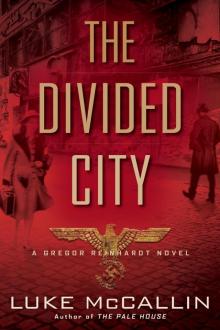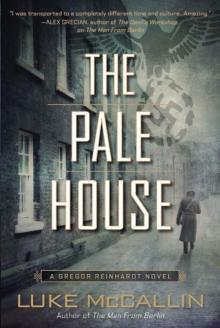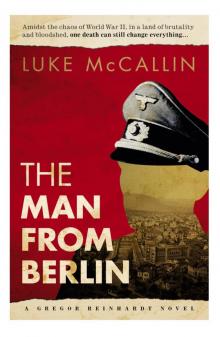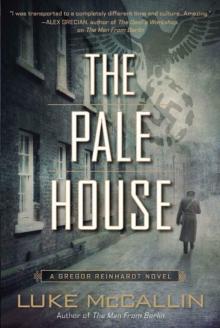- Home
- Luke McCallin
The Man from Berlin Page 2
The Man from Berlin Read online
Page 2
More Oriental carpets were laid out in other parts of the room, some of them rumpled, stained with the alcohol that had run from the bottles smashed across the floor from where they had fallen out of the drinks cabinet, itself lying facedown in shards of glass. A lamp on the floor, pokers strewn around the fireplace. One of the leather chairs askew, out of line with the others. And everywhere, lingering underneath it all, incongruous in this setting of refined luxury, was the smell of death.
Hendel’s body lay just to the right of the stairs, against the wall, with its torso slumped partly upright. A spray of blood and something darker had dribbled and dried down the wall above his head. He had been shot just below the nose, and from the burn marks around the wound the gun had been placed against his skin. Reinhardt’s right hand began to rise again of its own volition towards his temple and to the mark his own pistol had made there, but he covered it with a move to adjust the tuck of his cap under his other arm.
There was another smear of blood on the wall next to the door to the left. Freilinger was standing by that door with a big man in a dark but ill-fitting suit, both of them looking into the room beyond, which seemed to be brightly lit. Freilinger turned and saw Reinhardt standing by the hallway door. The major’s bullet head of close grey hair almost glowed in the strong light. As Freilinger’s eyes met his, Reinhardt suppressed a flinch at the sudden smell of smoke, there and gone just as fast. Swallowing, and looking left and right, Reinhardt walked across the living room, the parquet squeaking under his steps. His feet crunched on glass. Looking down, he saw a crescent of broken bottle with a Hennessy label, gold on black, like a piece of flotsam on the parquet floor.
Freilinger and the other man stepped away from the door, motioning Reinhardt over to the fireplace between the two tall windows. Glancing left, Reinhardt looked into a bedroom, saw part of a huge four-poster bed hung with silk, dark wood floors. He turned back to the two men, came to attention.
‘Reinhardt reporting as ordered, Major.’
‘This is Chief Inspector Putković, of the Sarajevo police. We have a problem, Reinhardt,’ said Freilinger, getting straight to the point as always. Freilinger had always maintained some distance between himself and Reinhardt, despite the common connection they had in Meissner, going back to the first war. ‘A double homicide, and one of the victims an army officer. Not only that, but an officer in military intelligence.’ He spoke quietly, his voice underlaid by a low, hoarse rasp, the legacy of a British gas attack in the first war. Speaking was painful for him. ‘This causes some jurisdictional problems, as you can well imagine, but I think the inspector and I have been able to come to a suitable arrangement.’
The inspector in question did not look like he felt a suitable arrangement had been reached at all. The man was big, in the way so many men in the Balkans seemed to be. Lots of fat on large bones. A taut paunch sagged over his belt, and his fists were like hams, the knuckles indented in the flesh. A porcine face, flat eyes that looked like anvils. He smelled of sweat and alcohol. ‘There is no need for German involvement. My men can handle this.’ His German was good, although heavily accented. He spoke to Freilinger, but his eyes bored into Reinhardt. ‘We are professionals.’
‘Quite frankly, I don’t care, and I’m getting tired of saying it,’ rasped Freilinger. Putković’s face went florid with his anger. ‘There are agreements and protocols for this sort of thing. I don’t care who the dead girl is. A German officer is dead. The two seem to me quite obviously to be linked together, however much you might not want them to be. You’ll work with Captain Reinhardt, who, I will remind you, has nearly twenty years as a detective in the Berlin Kriminalpolizei. Homicide and organised crime.’ He paused for breath but raised a hand to forestall the next protest from the Croat. ‘You will extend him every courtesy required. If you still wish to debate this, tell your commander to take it up with the general. Otherwise, we’re done.’
Putković’s jaws clenched. He stuck out his jaw, nodded, and then started for the stairs, clattering down them and hollering something to someone on the way out. Freilinger breathed out, shaking his head and putting his hand on the mantel of the fireplace. ‘God, what a bore.’ He looked up at Reinhardt. Freilinger was a small man, wiry, with piercing blue eyes. His skin was leathery and creased from a lifetime of soldiering. ‘This is no picnic I’ve landed you in, Reinhardt.’
‘No, sir.’
‘What do you have going at the moment?’
‘Third round of interrogations of the Partisan officers captured after Operation Weiss.’
‘Still?’
‘It’s the way I work, sir,’ wishing, as always, he did not sound so defensive about it.
Freilinger stared down at the carpet. ‘Very well,’ he said. ‘Hand them over to the camp authorities.’
‘Sir, I’m not finished with them.’
‘You are now. You won’t have time for them anyway.’ Freilinger lifted his eyes, flicked them around the room. ‘The reason I want you on this is Hendel was one of ours, and we keep this investigation close. I’m having Weninger and Maier go over his files, see if anything pops out that would link him to the dead girl.’ He paused as he took a small tin of French mints from his pocket, which he swore were the only thing that helped his throat, and popped one in his mouth. It was, as far as Reinhardt knew, the only habit or vice he had. ‘The dead girl is Marija Vukić.’ Reinhardt’s eyes widened. ‘You’ve heard of her?’
‘Marija Vukić? Yes, I have. I even met her once.’
‘Sort of a cross between Leni Riefenstahl and Marika Roekk?’ Reinhardt shrugged, nodded. ‘A filmmaker. A journalist. Well connected. And with a film star’s looks?’ Reinhardt nodded again, remembering the one time he had met her, and the impression she had made on him. ‘The Croats want whoever did this to her for themselves. I’m not sure they’re too bothered about Hendel, but if they can find a way to embarrass us with his death, they’ll probably try. They already have their list of usual suspects. I don’t doubt they’ll be breaking bones down at police headquarters fairly soon.’
‘I can perfectly understand the Croats’ preoccupation with finding the killer. Are you saying we’re in competition for suspects?’
‘Possibly. Possibly not. Maybe Hendel was killed after Vukić. But on the bright side, Putković has agreed to have Hendel examined by the police pathologist. It’ll save us time. We’ll know more then.’
‘Yes, sir.’ Reinhardt nodded, feeling a sudden sense of trepidation. In the hollow at the base of his spine he began to sweat. ‘Sir, shouldn’t the Feldgendarmerie have this one?’
Freilinger stared at Reinhardt, his chin moving as he rolled the mint around inside his mouth. ‘I’ll make sure the military police know you are leading this investigation, and that they give you whatever assistance you require. They’ve got enough on their plate with Operation Schwarz coming up, I would think. All eyes and effort’s going to be on that, on prising the Partisans down from out of their mountains and smashing them once and for all. And, like I said, Hendel was one of ours. We’ll take care of it.’ He paused, his fingers rubbing his throat. Thumb on one side, forefinger on the other. ‘I don’t know who the police’ll give you to work with, but try to be civil, and try to be quick.’ A swallow, the mint clicking against his teeth. ‘No one’s pretending the “Independent” in NDH means anything anymore. Especially now that just about every soldier they ever had that was worth anything is dead at Stalingrad.’ If he noticed Reinhardt’s discomfort at the mention of that city, he did not show it. ‘Relations are tense. Let’s see if we can’t keep these on an even keel.’
‘I’ll do my best, sir.’ Freilinger nodded. ‘One thing, sir. You do know that I haven’t attended a crime scene in over four years?’
The major looked back at him, his blue eyes like chips of glass, and a sudden flare, like a fire, deep within them, and again there was the smell of smoke in his nose. ‘That will
be all, Reinhardt. I’ve assigned Claussen to you. He’s Abwehr, so you can talk freely with him. He’s also ex-police. He’s a resourceful man, and even if he does not look that way now you’ll appreciate having a friendly face around. Report to me at the end of the day.’
‘Do I wait for Putković’s man before starting?’ The major walked to the window over the alley. Heated words were being exchanged out there.
‘I’m guessing Putković’s man is being briefed now.’ Reinhardt looked down at the big detective talking loudly with a handful of policemen, one in a suit. Putković emphasised whatever points he was making by slapping one fist into the palm of the other. Even from up here, Reinhardt could hear the meaty thud they made. There was a space around the man the others would not, or could not, enter. Not surprising, given the animal ferocity the man gave off. Freilinger shook his head. ‘Get going. Let them catch up.’
With that, he was gone. Standing alone, Reinhardt put his hands on the mantel and breathed deeply. He hung his head down between his arms, feeling the strain in the back of his neck. His headache was still there, heavy along the base of his skull. He looked at the portrait. A father? An uncle? A quick breath, and he stepped into the bedroom.
2
A middle-aged man, very thin and white, sprawled in a chair in a corner, polishing his glasses on his tie. He blinked owlishly at Reinhardt and said something in Serbo-Croat. ‘German,’ replied Reinhardt in German. The man put his glasses on, spotted Reinhardt, and half raised himself from the chair.
‘Sorry,’ he said, sitting back down. ‘Dr Begović.’ He appraised Reinhardt with an openness strangely refreshing from someone in a city where most people would not meet your eyes, and those who did always seemed to find something wrong with you. ‘Forgive me for not getting up, but I’ve been here for hours now.’ He scratched the corner of his mouth. ‘You’re the one they’ve been arguing about, eh?’
‘It would seem,’ replied Reinhardt, distantly. He mentally pushed the doctor aside and remained in the doorway. The bed was a big four-poster, directly in front of the door. A black dress made a crumpled ring on the floor at the end. There was a dresser with an oval mirror and upholstered stool against the wall to his left. Closed curtains ate the daylight along the wall to the right, but the light in the room was still very bright. There were two little tables on the end of the bed nearest him, on which rested two lamps, which were lit. Lights fitted into the wall to either side of the door were also lit, and the head of the bed was a big mirror. He saw himself reflected in the doorway and saw another big mirror hanging on the wall to his right.
His nose caught a subtle hint of fragrance, something expensive, under the heavy smell of blood, and the smell of death, which was much stronger here. The red stain on the door frame, a smear of blood across a panel of light switches, caught his eye. He saw another, a footprint, a third, a smear on the door of what he saw was the bathroom across to his left, as though a hand had reached for balance and slipped and slid. He breathed deeply, and Begović looked from him to the body on the bed.
‘Not pretty, is it?’ he said, with an ironic twist to his mouth.
Reinhardt’s heart began beating faster. He took a couple of steps closer to the bed and looked down at what was on it. ‘No, it’s not. So. Why don’t you tell me what we have here?’ he asked, with a nonchalance he did not feel.
Begović took off his thick-framed glasses and rubbed his watery eyes with the heel of his hand. Putting them back on, he blinked furiously, peered at Reinhardt, sniffed, then looked down at a notebook he pulled from a pocket. ‘What we have is a dead female, aged twenty-five to thirty years, deceased from approximately eighteen stab wounds to the stomach, upper chest and upper arms. In addition, there are signs of severe beating, strangulation marks around the neck, hair missing. There is blood and tissue under the fingernails, bruising on the knuckles, so she fought back. What little good it did her.’
Reinhardt nodded, listening to Begović reel off the horror that had happened to this woman. It did not do justice to what he saw laid out on the bed in front of him. Reinhardt remembered Marija Vukić as a stunning woman, statuesque, blond, a woman of grace and elegance. She still was, despite what the beating had done to her face, and the knife to the rest of her. Her eyes still kept a clarity of blue behind the veil that death had drawn over them. Her long blond hair still retained a sheen of gold despite its lying in matted disarray across sheets sodden red with her blood. Her skin, though, was ghostly white, the wounds the knife had left crusted and raw edged. Her limbs were long and straight, her legs gorgeous in black stockings, a garter belt around her narrow waist. She lay on the bed as if at rest, head on the pillow, arms at her sides, her legs drawn straight and together. The remains of a silk negligee, shredded and soaked in blood, lay rumpled about her torso.
As he ran his eyes over her, over what had been done to her, Reinhardt felt a peculiar sensation, a sort of fulfilment of an almost-forgotten imagining of what she might look like unclothed. Whatever it was, it felt wrong, but he recalled dancing with her, just the one dance, feeling her pressed lightly against him, her breast against his arm, her thigh against his.
‘Your German is very good, Doctor. Murder weapon?’
‘Thank you. Medical studies in Berlin in the thirties. A knife. A big one. Very sharp. Something like a kitchen knife, or a bayonet.’
‘Has it been found?’
‘Not that I’m aware of.’
‘Time of death?’
‘At a guess, I’d say sometime late on Saturday night.’
‘Did you look at the other body?’
‘Briefly. I was told to concentrate on this one. But I’d have said he died about the same time.’
‘Has forensics had a look at her, yet?’
Begović snorted. ‘Forensics?! Seriously? In this town? This isn’t Berlin, my friend, and we aren’t the Kripo.’
‘Right,’ Reinhardt breathed. What the doctor said would have been true of the Kriminalpolizei about ten years ago, but not anymore. He raised the dead woman’s arm by placing his wrists above and below hers so as to avoid leaving his own prints and saw the telltale marks of lividity underneath and on what he could see of her back. Reinhardt bent her arm, and it moved fairly well. Rigor mortis had come and was mostly gone. Begović was probably right with his guess, but they would need the pathologist to be sure.
The sound of someone taking the stairs two by two came from the other room. There was a pause as the person reached the top, and then the sound of the parquet as he came over to the bedroom. Reinhardt turned as the man in the suit he had seen from the window entered the room. Another tall man, but without Putković’s weight. He had longish brown hair, and dark, flat eyes. He glanced over the room and at the two of them standing there. His mouth firmed, and he stepped inside the room. ‘You are Reinhardt?’ he said. ‘I am Inspector Andro Padelin. From the Sarajevo police. My chief informs me we are to work together?’
‘That’s correct.’ Reinhardt stepped over to shake his hand. Not a small man himself, Reinhardt felt his hand enveloped in the other’s fist and squeezed, relatively hard. All the while Padelin looked at him with those dead eyes. It was he who let go, with a slight push, and the faintest of glances up and down, from Reinhardt’s boots to his greying hair. ‘Have you been briefed?’ Padelin nodded. ‘The doctor here was just giving me some insight into the wounds the woman sustained.’
Padelin turned those heavy eyes on the doctor, who did not seem perturbed. Probably because he had his glasses off again to polish them. ‘Yes. Well, it would have been courteous to wait.’
‘Shall we hear what he has to say, then?’ asked Reinhardt. Padelin nodded, slow and heavy, like a cat sunning itself. ‘Doctor, if you please?’
Begović cleared his throat. ‘Well, for what it’s worth, whoever did it was probably left-handed. Probably. That’s from the pattern of the wounds. The stab w
ounds go from her right to her left. The slashing wounds from her left to her right. And she received nearly all her wounds here, in this room and on the bed.’
‘Slashing and stabbing…’ said Reinhardt, quietly. ‘What does that tell you, Doctor?’
The coroner stared at her arm where it sagged stiffly over the side of the bed, the palm and fingers dark with blood. ‘I would guess from the depth of the wounds that whoever did it was not very strong. But from the spread of the wounds, the killer was slashing and stabbing wildly, maybe in a great hurry, or was deranged, or had strong reason to hate her. Maybe a combination of all.’
Still staring at the body, Reinhardt shook an Atikah from his pack and put it in his mouth, before offering the pack to Begović and Padelin. The detective refused with a shake of the head, while Begović pounced eagerly on his cigarette, rolling it delicately between his fingers before letting Reinhardt light it. The flare from his match woke answering glints in Vukić’s eyes, and the memory of dancing with her under a spreading chandelier came to him again. A Christmas dance, just a few months ago, for the officers of the garrison, the city caked in snow and ice. She had smiled and laughed, joked and cajoled, given as good as she got with the banter, posed for photographs, danced with them, then left, all light and movement, and a scent that glittered. A smell of tobacco tangled with the iron scent of the woman’s blood, clamouring across the memory of that evening. Reinhardt swallowed and took a little round tin from his hip pocket, into which he tapped his ash.
‘He beat her, then stabbed her?’
‘Could be,’ said Begović, around a deep drag. He tore a page from his notebook and crumpled it in his hand to serve as an ashtray.
Reinhardt stared at her. At the rumpled sheets. A champagne glass with a thick smudging of fingerprints stood on a bedside table. On the other side of the bed, on a similar table, was an ashtray with a number of stubbed ends. ‘Was there sex?’ As he moved slightly, the surface of the table caught the light. A ring mark, faint and almost faded.

 The Divided City
The Divided City The Pale House
The Pale House The Man from Berlin
The Man from Berlin The Pale House (A Gregor Reinhardt Novel)
The Pale House (A Gregor Reinhardt Novel)